Author Photo And Bio
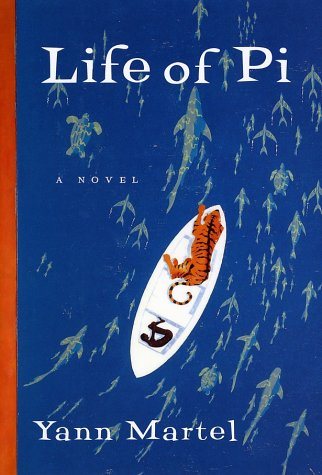 1. Life of Pi by Yann Martel (2001). The son of a zookeeper, Pi Patel has an encyclopedic knowledge of animal behavior and a fervent love of stories. When Pi is sixteen, his family emigrates from India to North America aboard a Japanese cargo ship, along with their zoo animals bound for new homes. The ship sinks. Pi finds himself alone in a lifeboat, his only companions a hyena, an orangutan, a wounded zebra, and Richard Parker, a 450-pound Bengal tiger. Soon the tiger has dispatched all but Pi, whose fear, knowledge, and cunning allow him to coexist with Richard Parker for 227 days while lost at sea. When they finally reach the coast of Mexico, Richard Parker flees to the jungle, never to be seen again. The Japanese authorities who interrogate Pi refuse to believe his story and press him to tell them "the truth." After hours of coercion, Pi tells a second story, a story much less fantastical, much more conventional - but is it more true?
1. Life of Pi by Yann Martel (2001). The son of a zookeeper, Pi Patel has an encyclopedic knowledge of animal behavior and a fervent love of stories. When Pi is sixteen, his family emigrates from India to North America aboard a Japanese cargo ship, along with their zoo animals bound for new homes. The ship sinks. Pi finds himself alone in a lifeboat, his only companions a hyena, an orangutan, a wounded zebra, and Richard Parker, a 450-pound Bengal tiger. Soon the tiger has dispatched all but Pi, whose fear, knowledge, and cunning allow him to coexist with Richard Parker for 227 days while lost at sea. When they finally reach the coast of Mexico, Richard Parker flees to the jungle, never to be seen again. The Japanese authorities who interrogate Pi refuse to believe his story and press him to tell them "the truth." After hours of coercion, Pi tells a second story, a story much less fantastical, much more conventional - but is it more true?
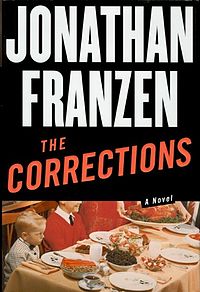 2. The Corrections by Jonathan Franzen (2001). After almost fifty years as a wife and mother, Enid Lambert is ready to have some fun. Unfortunately, her husband, Alfred, is losing his sanity to Parkinson's disease, and their children have long since flown the family nest to the catastrophes of their own lives. The oldest, Gary, a once-stable portfolio manager and family man, is trying to convince his wife and himself, despite clear signs to the contrary, that he is not clinically depressed. The middle child, Chip, has lost his seemingly secure academic job and is failing spectacularly at his new line of work. And Denise, the youngest, has escaped a disastrous marriage only to pour her youth and beauty down the drain of an affair with a married man-or so her mother fears. Desperate for some pleasure to look forward to, Enid has set her heart on an elusive goal: bringing her family together for one last Christmas at home which she tries to do in this National Book Award-winning novel.
2. The Corrections by Jonathan Franzen (2001). After almost fifty years as a wife and mother, Enid Lambert is ready to have some fun. Unfortunately, her husband, Alfred, is losing his sanity to Parkinson's disease, and their children have long since flown the family nest to the catastrophes of their own lives. The oldest, Gary, a once-stable portfolio manager and family man, is trying to convince his wife and himself, despite clear signs to the contrary, that he is not clinically depressed. The middle child, Chip, has lost his seemingly secure academic job and is failing spectacularly at his new line of work. And Denise, the youngest, has escaped a disastrous marriage only to pour her youth and beauty down the drain of an affair with a married man-or so her mother fears. Desperate for some pleasure to look forward to, Enid has set her heart on an elusive goal: bringing her family together for one last Christmas at home which she tries to do in this National Book Award-winning novel.
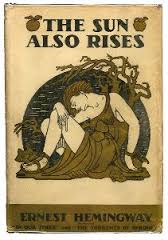 3. The Sun Also Rises by Ernest Hemingway (1926). Hemingway’s first novel recounts the revels and misadventures of the expatriate community—including the introspective writer Jake Barnes and the tantalizingly elusive divorcée Lady Brett Ashley—in Paris and in Spain’s bullfighting centers. For all their wit, wealth, or social clout and despite their rounds of drunkenness and debauchery as repetitious as the sun’s daily rising, Hemingway’s jaded, morally bankrupt characters can’t get no satisfaction.
3. The Sun Also Rises by Ernest Hemingway (1926). Hemingway’s first novel recounts the revels and misadventures of the expatriate community—including the introspective writer Jake Barnes and the tantalizingly elusive divorcée Lady Brett Ashley—in Paris and in Spain’s bullfighting centers. For all their wit, wealth, or social clout and despite their rounds of drunkenness and debauchery as repetitious as the sun’s daily rising, Hemingway’s jaded, morally bankrupt characters can’t get no satisfaction.
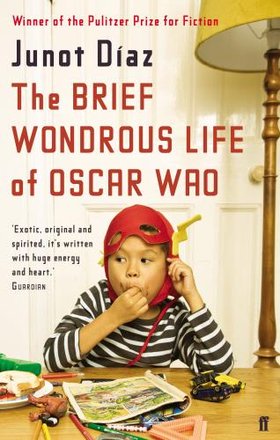 4. The Brief Wondrous Life of Oscar Wao by Junot Diaz (2007). Things have never been easy for Oscar, a sweet but disastrously overweight, lovesick Dominican ghetto nerd. From his home in New Jersey, where he lives with his old-world mother and rebellious sister, Oscar dreams of becoming the Dominican J. R. R. Tolkien and, most of all, of finding love. But he may never get what he wants, thanks to the Fukœ-the curse that has haunted the Oscar's family for generations, dooming them to prison, torture, tragic accidents, and, above all, ill-starred love. Oscar, still waiting for his first kiss, is just its most recent victim. D’az immerses us in the tumultuous life of Oscar and the history of the family at large, rendering with genuine warmth and dazzling energy, humor, and insight the Dominican-American experience, and, ultimately, the endless human capacity to persevere in the face of heartbreak and loss.
4. The Brief Wondrous Life of Oscar Wao by Junot Diaz (2007). Things have never been easy for Oscar, a sweet but disastrously overweight, lovesick Dominican ghetto nerd. From his home in New Jersey, where he lives with his old-world mother and rebellious sister, Oscar dreams of becoming the Dominican J. R. R. Tolkien and, most of all, of finding love. But he may never get what he wants, thanks to the Fukœ-the curse that has haunted the Oscar's family for generations, dooming them to prison, torture, tragic accidents, and, above all, ill-starred love. Oscar, still waiting for his first kiss, is just its most recent victim. D’az immerses us in the tumultuous life of Oscar and the history of the family at large, rendering with genuine warmth and dazzling energy, humor, and insight the Dominican-American experience, and, ultimately, the endless human capacity to persevere in the face of heartbreak and loss.
 5. Jane Eyre by Charlotte Brontë (1847). Like Wuthering Heights, this is a romance set in the isolated moors of rural England the Brontës called home. Its title character is an exceptionally independent orphan who becomes governess to the children of an appealing but troubled character, Mr. Rochester. As their love develops, the author introduces a host of memorable characters and a shattering secret before sending Jane on yet another arduous journey.
5. Jane Eyre by Charlotte Brontë (1847). Like Wuthering Heights, this is a romance set in the isolated moors of rural England the Brontës called home. Its title character is an exceptionally independent orphan who becomes governess to the children of an appealing but troubled character, Mr. Rochester. As their love develops, the author introduces a host of memorable characters and a shattering secret before sending Jane on yet another arduous journey.
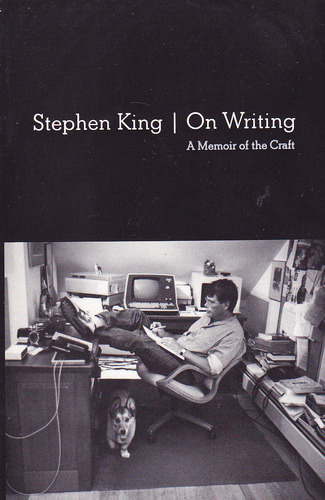 6. On Writing by Stephen King (2000). Part memoir, part master class by one of the bestselling authors of all time, this superb volume is a revealing and practical view of the writer's craft, comprising the basic tools of the trade every writer must have. King's advice is grounded in his vivid memories from childhood through his emergence as a writer, from his struggling early career to his widely reported near-fatal accident in 1999—and how the inextricable link between writing and living spurred his recovery.
6. On Writing by Stephen King (2000). Part memoir, part master class by one of the bestselling authors of all time, this superb volume is a revealing and practical view of the writer's craft, comprising the basic tools of the trade every writer must have. King's advice is grounded in his vivid memories from childhood through his emergence as a writer, from his struggling early career to his widely reported near-fatal accident in 1999—and how the inextricable link between writing and living spurred his recovery.
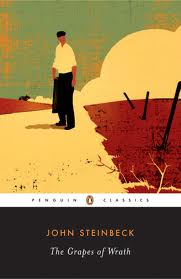 7. The Grapes of Wrath by John Steinbeck (1939). A powerful portrait of Depression-era America, this gritty social novel follows the Joad family as they flee their farm in the Oklahoma dust bowl for the promised land of California. While limping across a crippled land, Ma and Pa Joad, their pregnant daughter Rose of Sharon, and their recently paroled son Tom sleep in ramshackle Hoovervilles filled with other refugees and encounter hardship, death, and deceit. While vividly capturing the plight of a nation, Steinbeck renders people who have lost everything but their dignity.
7. The Grapes of Wrath by John Steinbeck (1939). A powerful portrait of Depression-era America, this gritty social novel follows the Joad family as they flee their farm in the Oklahoma dust bowl for the promised land of California. While limping across a crippled land, Ma and Pa Joad, their pregnant daughter Rose of Sharon, and their recently paroled son Tom sleep in ramshackle Hoovervilles filled with other refugees and encounter hardship, death, and deceit. While vividly capturing the plight of a nation, Steinbeck renders people who have lost everything but their dignity.
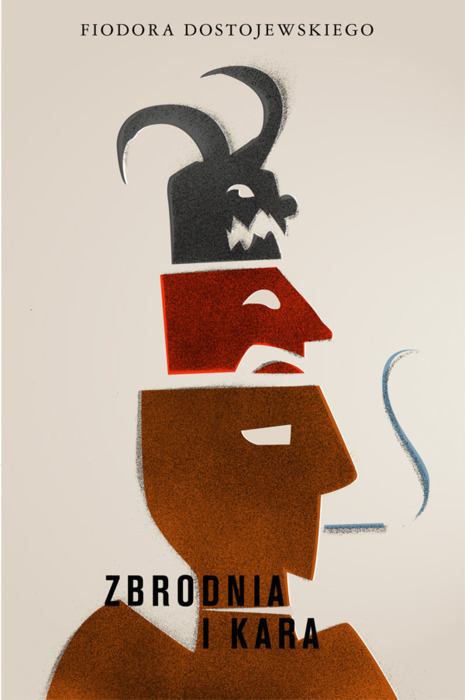 8. Crime and Punishment by Fyodor Dostoevsky (1866). In the peak heat of a St. Petersburg summer, an erstwhile university student, Raskolnikov, commits literature’s most famous fictional crime, bludgeoning a pawnbroker and her sister with an axe. What follows is a psychological chess match between Raskolnikov and a wily detective that moves toward a form of redemption for our antihero. Relentlessly philosophical and psychological, Crime and Punishment tackles freedom and strength, suffering and madness, illness and fate, and the pressures of the modern urban world on the soul, while asking if “great men” have license to forge their own moral codes.
8. Crime and Punishment by Fyodor Dostoevsky (1866). In the peak heat of a St. Petersburg summer, an erstwhile university student, Raskolnikov, commits literature’s most famous fictional crime, bludgeoning a pawnbroker and her sister with an axe. What follows is a psychological chess match between Raskolnikov and a wily detective that moves toward a form of redemption for our antihero. Relentlessly philosophical and psychological, Crime and Punishment tackles freedom and strength, suffering and madness, illness and fate, and the pressures of the modern urban world on the soul, while asking if “great men” have license to forge their own moral codes.
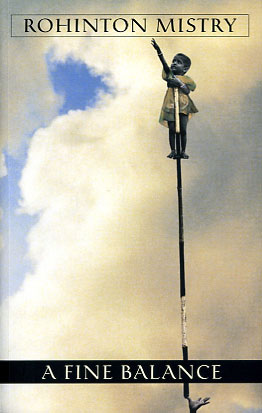 9. A Fine Balance by Rohinton Mistry (1995). With a compassionate realism and narrative sweep that recall the work of Charles Dickens, this novel captures all the cruelty and corruption, dignity and heroism, of India. The time is 1975. The place is an unnamed city by the sea. The government has just declared a State of Emergency, in whose upheavals four strangers—a spirited widow, a young student uprooted from his idyllic hill station, and two tailors who have fled the caste violence of their native village—will be thrust together, forced to share one cramped apartment and an uncertain future. As the characters move from distrust to friendship and from friendship to love, A Fine Balance creates an enduring panorama of the human spirit in an inhuman state.
9. A Fine Balance by Rohinton Mistry (1995). With a compassionate realism and narrative sweep that recall the work of Charles Dickens, this novel captures all the cruelty and corruption, dignity and heroism, of India. The time is 1975. The place is an unnamed city by the sea. The government has just declared a State of Emergency, in whose upheavals four strangers—a spirited widow, a young student uprooted from his idyllic hill station, and two tailors who have fled the caste violence of their native village—will be thrust together, forced to share one cramped apartment and an uncertain future. As the characters move from distrust to friendship and from friendship to love, A Fine Balance creates an enduring panorama of the human spirit in an inhuman state.
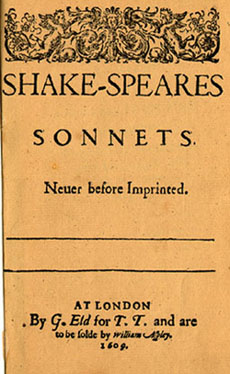 10. Sonnets by William Shakespeare (1564-1616).
10. Sonnets by William Shakespeare (1564-1616).